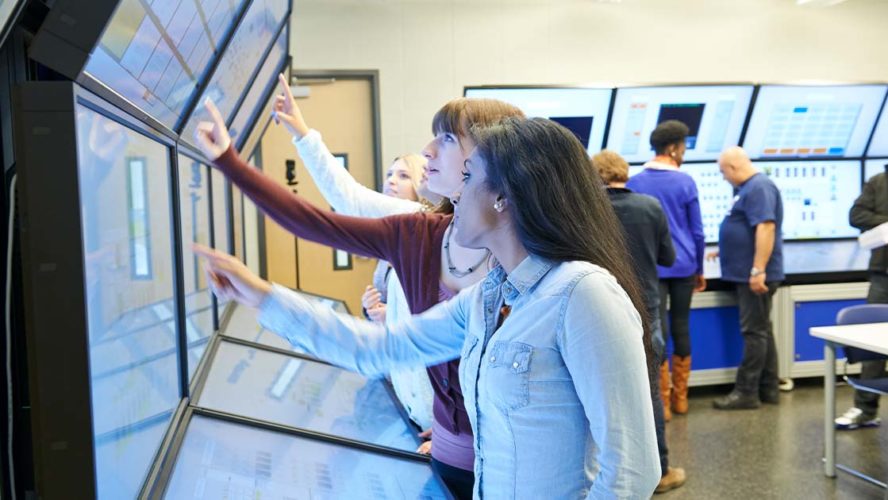
Dr. Markus Piro
Chair, Department of Energy and Nuclear Engineering, Faculty of Engineering and Applied Science, Ontario Tech University
Nuclear is not only a means to help Canada reach net-zero carbon but also a dynamic and exciting career choice.
Nuclear power has been an integral part of Ontario’s energy landscape for many years, producing as much as 60 per cent of the province’s electricity. “It has also contributed to Ontario having among the lowest greenhouse gas emissions from electricity in the world,” says Dr. Markus Piro, Canada Research Chair in Nuclear Fuels and Materials, and Chair of Department of Energy and Nuclear Engineering, Faculty of Engineering and Applied Science at Ontario Tech University. Going forward, nuclear energy is expected to play a key role in helping Canada meet its net-zero carbon targets and sustainability commitments.
Ontario Tech University has nuclear in its DNA
Located in Durham Region — where Pickering and Darlington supply 30 per cent of Ontario’s electricity, about half of the province’s nuclear energy — Ontario Tech is a major supplier of talent to the nuclear industry. Since its inception, Engineering at Ontario Tech has provided the nuclear sector with highly qualified graduates to satisfy industry demand. We offer the only accredited undergraduate nuclear engineering program in Canada. “A large number of faculty in our engineering programs have worked in the industry and are currently conducting related research, so they’re able to connect the classroom experience and course content directly to what the industry needs,” says Dr. Piro.
In addition to undergraduate and graduate programs, Ontario Tech offers continuous learning through customized programs for industry. “We have many engineers and managers from Ontario Power Generation, for example, coming to the university’s Nuclear Simulation Lab to be trained on all aspects of the Darlington Nuclear Generating Station. Our simulation lab is a unique facility that you cannot find at any other Canadian university,” says Dr. Piro.
A key research focus for Ontario Tech is energy. “We have a number of energy-related projects and direct collaborations with industry, as well as a number of research facilities that are distinct to the university,” says Dr. Piro. These include the only International Atomic Energy Agency Collaborating Centre in Canada, investigating the integration of nuclear with other technologies; the Brilliant Energy Institute, which provides communities, industry, policy makers and individuals, the scientific, evidence-based knowledge and collaboration mechanisms necessary to achieve net-zero; and the Clean Energy Research Lab, a leading hydrogen-related research facility. Ontario Tech is also home to the Centre for Small Modular Reactors (SMRs). “Development in SMRs is multi-faceted in that they can be used in numerous ways, such as at the grid level to replace existing coal plants, power small remote northern communities, and for other applications outside of electricity production, like mining,” says Dr. Piro.
A dynamic, innovative industry poised for growth
Students interested in science, technology, engineering and math (STEM) careers may want to consider the nuclear industry and Ontario Tech. “The nuclear industry is very strong, stable, and growing, and Ontario Tech’s leadership in clean energy research with industry enable us to provide high-quality education to the students, and highly qualified personnel to our industry stakeholders,” says Dr. Piro.
The nuclear industry is very strong, stable, and growing, and Ontario Tech’s close ties with the industry enable us to provide high-quality education to the students and highly qualified personnel to our industry stakeholders.
Currently, there are around 60,000 jobs in nuclear across Canada, and that number is expected to increase in the coming years. “There are many exciting things going on right now, particularly with regard to ongoing refurbishment projects and SMRs, and that means plenty of career opportunities,” says Dr. Piro.
In support of the nuclear industry’s aim to achieve equal representation of females to males, Ontario Tech is strengthening gender diversity in its engineering programs, especially the nuclear engineering program, through an initiative called Equal by 30. This initiative includes partnerships with organizations like Women in Nuclear and Bruce Power. “Bruce Power has committed to providing dedicated co-ops and internships for women engineering students, which is pretty amazing,” says Dr. Piro.




